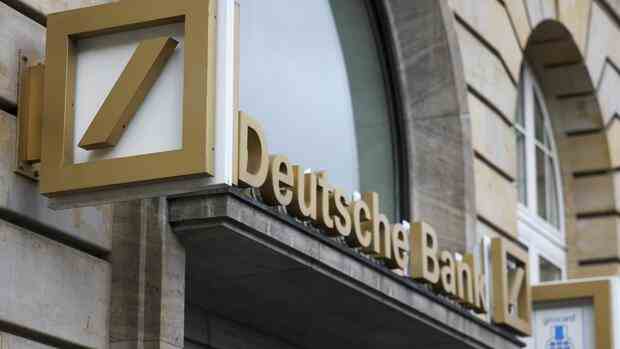The money house has commissioned a large British law firm for the investigation, which is internally called “Project Teal”.
(Photo: Bloomberg)
Frankfurt Some Deutsche Bank investment bankers have acted disingenuously and in bad faith in selling complex derivatives to Spanish mid-market companies. According to Handelsblatt information, this is the result of an internal investigation into the business, which was initiated in 2019 by a whistleblower. During the review, deficiencies in the control systems were also complained about.
According to financial circles, the focus of the investigation was a London desk of the investment bank, which was responsible for products for hedging currency risks. According to the auditors, employees working there sold complex derivatives to Spanish medium-sized companies and praised them as safe and cheap. In truth, however, the products with which Deutsche Bank made high profits were risky. Some customers suffered heavy losses.
According to financial circles, a small group of employees was involved in the business. Less than a dozen workers have now been sanctioned, said a person familiar with the issue. The smaller part of them was prosecuted for active and conscious misconduct, the larger part because of the lack of supervision of employees. The sanctions include a reduction in variable remuneration.
Deutsche Bank hired a large British law firm to conduct the investigation, which is known internally as “Project Teal”. According to the whistleblower, the latter also investigated whether there had been similar incidents in other areas of Deutsche Bank. According to financial circles, the auditors did not find anything, but they also found deficits in the controls in other departments.
The investigation, the results of which were first reported by the Financial Times (“FT”), is nearing completion, according to financial sources. In principle, the processing of the transactions has been completed. However, the implementation of the consequences that the institute draws from the case – for example an improvement in its controls – is still ongoing.
Deutsche Bank has compensated some customers
Deutsche Bank said it has reviewed parts of its “Structured FX Derivatives distribution and taken appropriate action. As we and our regulators expect of us, we are improving our processes and strengthening our controls.” The bank could not comment on the details.
The European securities directive Mifid forces financial institutions to sort their customers into different risk categories depending on their expertise. This classification determines which products may be sold to this customer. The more inexperienced a customer is, the simpler and more understandable the products must be.
In the case of some companies, Deutsche Bank apparently did not comply with these rules and has now compensated them. According to “FT”, for example, the institute paid the wine dealer J. García-Carrión more than ten million euros to compensate for losses from currency derivatives.
Deutsche Bank is defending itself against a lawsuit by the Spanish hotel group Palladium, which has sued the institute for damages of 500 million euros for losses with currency derivatives. She believes Palladium has extensive experience with derivatives and is therefore able to assess the risks involved.
Weak control systems are an ongoing issue
Germany’s largest money house has repeatedly made headlines in recent years due to scandals and weak control systems. In 2022, the bank was sentenced to a fine of seven million euros for suspected money laundering cases that were reported too late. Among other things, the institute had not reported a payment she had made from the family of the Syrian dictator Bashar al-Assad.
>> Read here: Deals by the Assad clan trigger raids on Deutsche Bank
Because the bank reported the greenwashing allegations to its fund subsidiary DWS too late, it also has trouble with the American financial regulator. Supervisory Board Chairman Alexander Wynaendts therefore wants to focus on strengthening the control systems in the coming years.
“The board has always delivered the numbers, and that’s important,” Wynaendts said recently in an interview with the Handelsblatt. “On the other hand, we must continue to work hard on our internal controls and the elimination of weaknesses in order to improve and meet all the requirements of the regulatory authorities. The bank has made progress, but much remains to be done.”
More: ECB fines Helaba millions – regulator speaks of “serious violation”
